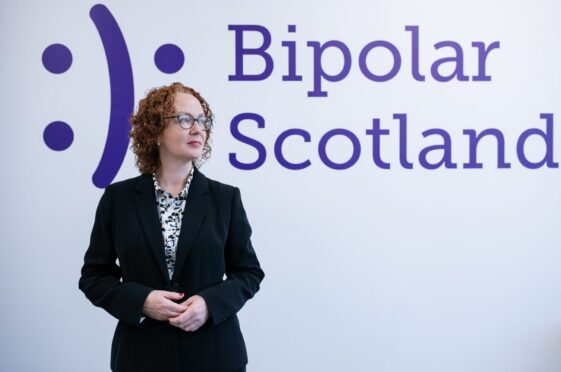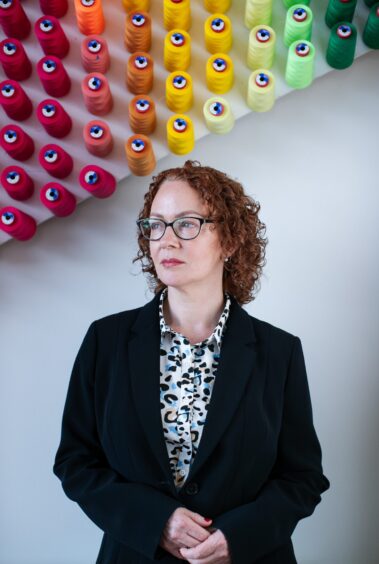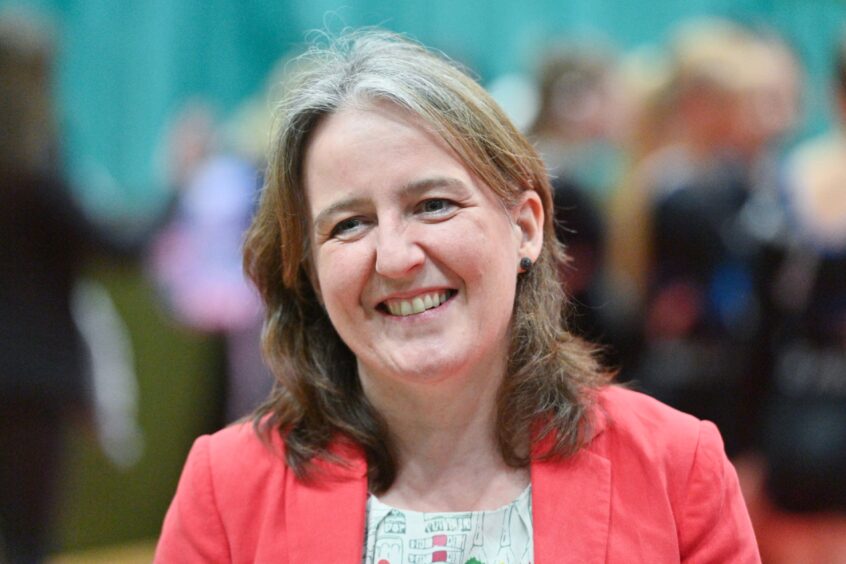
Family doctors must identify serious mental illness sooner to reduce life-threatening decade-long delays in diagnosis, experts warn today.
Calls for greater urgency and better training come as Scots with bipolar disorder wait 9.8 years on average to be correctly diagnosed after first visiting their GP.
The illness affects an estimated one in 50 people and Jayne Laidlaw, chief executive of Bipolar Scotland, warns lives are being lost as patients are forced to wait for life-changing diagnosis, treatment and support.
She is calling for urgent action to ensure GPs are better trained to ask the right questions and refer bipolar patients for specialist help far sooner.
Laidlaw said: “We are appalled diagnosis is still taking so long because in those intervening years people are taking their lives.
“We know this because people who have eventually had a diagnosis, who finally have their medication, are still 20 times more likely to die by suicide than the general population.”
Waits for bipolar diagnosis
Bipolar disorder, along with schizophrenia, is one of the most serious mental health conditions, with patients cycling between extreme moods; periods of mania when they can feel euphoric and superhuman to despairing lows of suicidal depression.
Many sufferers begin showing symptoms in their teenage years but, even if they seek medical help, are often wrongly diagnosed with depression.
When people are finally diagnosed correctly, Laidlaw said, their feelings are often a mixture of great relief and huge sadness.
She said: “Ten years is the average but we have people who waited 40 years for a diagnosis and whose world fell apart in the meantime.
“They might have been arrested, or been in and out of hospital. They might have lost their jobs, their marriages, contact with their children, their dignity and their self-respect. There is a sadness it took so long. There is real loss.”
She said a diagnosis can be life-changing, however, adding: “Once you have the right treatment the transformation is amazing. People can live well and enjoy a good life with the right support and an early diagnosis. That’s our mission.”
Laidlaw, who joined the charity earlier this year after a career spent in the third sector working to protect children and improve mental health care, said: “When someone is experiencing mania, they feel utterly invincible, superhuman.
“They are often highly productive, very intelligent, high-achievers and simply don’t think they’re unwell. When they present to GPs is when they have hit rock bottom, when the world has come crashing down around them.
“What the GP sees is someone who is suicidal, with no motivation or energy, who can’t get out of bed for months on end.
“That can look like depression but isn’t and they are often put on medication that makes things worse because it is the wrong treatment.”
Speeding up diagnosis
Bipolar Scotland is now urging family doctors, NHS Scotland trainers and psychiatrists to come together to help speed up diagnosis.
Laidlaw said: “It is difficult to diagnose in some ways but primary care staff are not asking the right questions. That is the bottom line.
“They should be asking far more about family history and they should be asking far more about periods of mania.”
The charity, with a staff of 13 supported by 50 volunteers, delivers support services, in person and online, to people with bipolar and their families across Scotland.
It is hoping to form a working group with the Royal College of Psychiatrists in Scotland, Royal College of GPs and NHS Education for Scotland (NES), which is responsible for training.
Laidlaw said: “We want them to work alongside us and use the voice of lived experience to train GPs better, to ask the right questions and to recognise the symptoms.”
She will explain the action plan to Maree Todd, the minister for mental health, when she visits the charity’s offices in Paisley this week.
She said: “We need the health boards to persuade their staff that they need this training and we need NES to design the training with us.”
Psychiatrists not GPs diagnose bipolar and, she adds, the key is quicker referrals to psychiatric services.
Bipolar effects
There are two types of bipolar, 1 and 2, and Type 1 is often easier to diagnose because of spiralling mania and its often disastrous consequences.
Earlier this year, Rosie Viva, a model turned mental health activist, told how she was diagnosed with bipolar disorder at 22 after suffering a psychotic episode at Stansted Airport and causing an evacuation.
Believing she was dreaming after a sleepless night, she kissed a stranger, stole from shops and bought breakfast for everyone in a McDonald’s before, suddenly panicking, climbing into a baggage drop-off area and setting off a fire alarm.
Laidlaw said that kind of experience is not uncommon: “It happens that quickly. Boom, just like that. With a bang, with a catastrophe.
“Meanwhile, other types of bipolar can go under the radar for years and years, an unimaginable length of time. Those are the people who are not being admitted to hospital or getting the right treatment for years and years.”
However, even when diagnoses are made, the charity fears a lack of resources is undermining care, with psychiatric services across Scotland under increasing pressure while facing systemic problems in recruiting and retaining staff.
Pavan Srireddy, vice chairman of the Royal College of Psychiatrists in Scotland, last week told MSPs high demand, long waiting times and lack of resources were driving specialist services in Scotland into a “death spiral”.
Laidlaw said: “When a diagnosis for bipolar is made and medication is sorted out, care can be passed to community psychiatric nurses but it remains hit and miss.
“There are too many patients needing support in the community and not enough support available.
“We complement health care and can pick up some of the slack but there is still a shortfall in care.”
Laidlaw says the enduring stigma surrounding serious mental illness has surprised her most since joining the charity earlier this year and is, she believes, one reason for the lack of urgency to speed diagnosis.
She said: “If this was diabetes or heart disease and it was taking 10 years for diagnosis, can you imagine the reaction?
“Scotland has made huge leaps in recent years about destigmatising mental health generally but it tends to be around conditions like anxiety, depression and low self-esteem. The most severe and enduring mental health conditions, schizophrenia and bipolar disorder, for example, are still hugely stigmatised and routinely spoken about in negative ways. That must change because people who live well with bipolar disorder are extraordinary; creative, intelligent, productive and contributing to society.
“There is nothing they cannot achieve without the right support. We can be part of that and GPs must be part of that too.”
I fought with psychiatrists for years, now I help sufferers
Bipolar disorder is a tightrope, according to Kerry Adam, and one she has walked since her teenage years.
The manic highs and crashing, crushing lows of one of the most serious mental health conditions have coloured her life but, she says, no longer dominate it.
As a teenager, doctors wrongly diagnosed depression and it would take another 15 years before her condition was accurately diagnosed and several more before she would accept it.
Adam, 42, said: “I fought with psychiatrists for two years.
“My bipolar tends towards the upside, hypomania, and I would feel like I was in technicolour while the rest of the world was in black and white.
“In that mood, I was the biggest personality in every room, I felt superhuman.
“When I was eventually diagnosed, I accused the psychiatrists of trying to pathologise what I perceived to be my personality.
“I didn’t want to accept it.”
High-functioning through her 20s when she pursued her passion for music and a career in higher education, Adam was in her mid-30s before finally being diagnosed as bipolar and, with the right medication and careful self-management, her condition has now been stable for six years. She takes nothing for granted, however.
She said: “It is about constant vigilance, being aware of your mood, constantly asking questions of yourself.
“How am I feeling? What’s happening in my life that might be influencing that?”
Adam now works for Bipolar Scotland delivering online and in-person courses on lifestyle strategies to help people with bipolar – and their families – manage their condition and live well.
She said: “Even after diagnosis, medication can take years to get right but is a big part of living with the condition.
“What we offer is non-clinical help and support on the practical supports that can bolster stability.
“Things like building everyday routines, exercise, regular sleep patterns, an awareness of potential triggers. There are many ways of managing bipolar disorder and delivering stability.
“It is a massive diagnosis, a huge lifelong diagnosis, and, faced with it, people welcome reassurance that there are tried and tested ways of living well with bipolar.
“That advice and support can be transformational, life-changing.”

Enjoy the convenience of having The Sunday Post delivered as a digital ePaper straight to your smartphone, tablet or computer.
Subscribe for only £5.49 a month and enjoy all the benefits of the printed paper as a digital replica.
Subscribe © Andrew Cawley
© Andrew Cawley © Jason Hedges/DC Thomson
© Jason Hedges/DC Thomson © Hannah Young/Shutterstock
© Hannah Young/Shutterstock